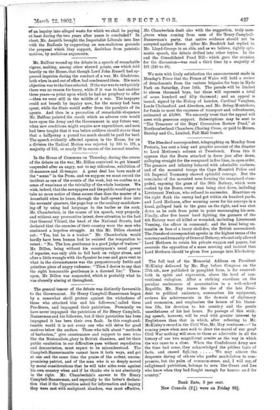Mr. Balfour wound up the debate in a speech of
remarkable vigour, making, among other shrewd points, one which told heavily on the House, that though Lord John Russell had ap- proved inquiries during the conduct of a war, Mr. Gladstone, both when in and out of office, had condemned them. His main objection was to the time selected. If the war was to end quickly there was no reason for hurry, while if it was to last another three years—a point upon which he had no prophecy to offer —then we were still in the middle of a war. The taxpayer could not benefit by inquiry now, for the money had been spent, while the State would suffer from the paralysis of its agents. And then in a peroration of remarkable eloquence Mr. Balfour painted the result which an adverse vote would have upon the Army and the Government in any future war, when new conditions might require new expenditure, and men had been taught that it was better soldiers should starve than that a halfpenny a pound too much should be paid for beef. The speech evidently affected opinion in the House, for on a division the Radical Motion was rejected by 346 to 191, a majority of 155, or nearly 30 in excess of the normal number.










































 Previous page
Previous page